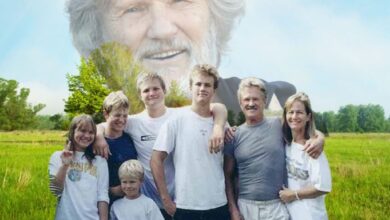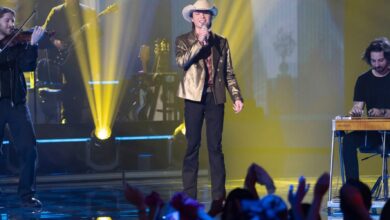Charlie Kirk’s Memorial: A Night of Faith, Patriotism, and Music
The memorial service for conservative activist Charlie Kirk on September 21, 2025, drew one of the largest crowds ever to gather inside State Farm Stadium in Glendale, Arizona. Tens of thousands filled the venue, while many more gathered outside in overflow areas, reflecting the scale of support Kirk inspired during his life. The service combined moments of deep grief with powerful expressions of unity, patriotism, and faith.
The event followed Kirk’s sudden death on September 10 at Utah Valley University, where he was scheduled to deliver a speech. His passing shocked supporters across the nation, particularly among those who admired his outspoken advocacy for faith, family, and freedom. The large turnout in Arizona was a testament to the movement he built and the people who saw him as a voice for their values.
Family members, close friends, and prominent leaders gave tributes throughout the evening. Each reflected on Kirk’s passion for connecting with younger generations and his commitment to the principles that guided his activism. Their stories painted a picture not only of a political figure, but also of a husband, father, and friend whose influence extended far beyond the public stage.
Music played a central role in the gathering. A lineup of Christian artists—including Chris Tomlin, Brandon Lake, Phil Wickham, Kari Jobe, and Cody Carnes—led worship sessions that turned the stadium into a vast congregation. Attendees described these moments as both mournful and uplifting, giving space for sorrow while encouraging hope in the face of tragedy.
The most anticipated moment of the night came when country legend Lee Greenwood took the stage. Known for his patriotic anthem “God Bless the U.S.A.”, Greenwood has performed the song at countless historic events since its release in 1984. From presidential inaugurations to national celebrations, the song has long carried emotional weight. On this night, however, the lyrics resonated in a particularly personal and poignant way.
As Greenwood began to sing, thousands of voices joined in from the stands. The sight of a stadium filled with people singing together reflected the blend of grief and patriotism that marked the entire evening. Attendees later shared that the performance became a defining moment, capturing both the sorrow of Kirk’s loss and the resilience of those determined to carry on his vision.
State Farm Stadium, with a capacity of over 63,000 for football and larger numbers for expanded events, provided a fitting setting for such a monumental occasion. Reports noted that overflow areas were needed to accommodate the demand, with tens of thousands more outside the main venue. The scale of the gathering underscored how deeply Kirk’s work had touched communities across the United States.
For many, Greenwood’s performance represented more than a musical tribute. It became a unifying force in the midst of division and grief. The chorus—“Cause there ain’t no doubt I love this land, God bless the USA”—took on new meaning as thousands sang it not only as an anthem for the nation but as a gesture of respect to a fallen leader.
Observers compared the atmosphere to some of Greenwood’s most historic performances, such as during the Gulf War era and following the events of September 11, 2001. In Glendale, however, the song was sung in remembrance of a specific individual, linking personal loss with national identity in a way rarely seen at memorials.
The service also carried the feeling of a rally, with speakers encouraging attendees to continue the mission Kirk had embraced during his career. For many in the audience, the event was both a farewell and a call to action, blending mourning with renewed determination. Greenwood’s song, framed within that context, became an anthem of continuity as much as remembrance.
Media coverage highlighted the unique nature of the gathering. While political memorials often divide, this one was noted for its emphasis on unity, worship, and shared values. Though attendees held strong political beliefs, the dominant tone was one of honoring life, faith, and community rather than political debate. Greenwood’s presence helped reinforce that spirit.
In the days following the service, clips of Greenwood’s performance circulated widely online. Viewers who had not attended the event described being moved by the imagery of tens of thousands singing together. Social media posts frequently noted how the song brought comfort and pride in a moment of grief, continuing Greenwood’s role as a musical voice for American patriotism.
The impact of the memorial extended beyond Arizona. Supporters across the country held watch parties and livestream gatherings, further amplifying the scale of the remembrance. For those who could not travel to Glendale, Greenwood’s performance became a symbolic centerpiece of the service, representing the emotional core of the evening.
As time passes, the memory of Kirk’s life and work will continue to spark discussion and reflection. Yet for those present at State Farm Stadium, Greenwood’s rendition of “God Bless the U.S.A.” remains inseparable from the night. It served as both a farewell to a controversial but influential figure and as a reminder of the unifying power of music during times of loss.
Ultimately, the memorial for Charlie Kirk demonstrated how patriotism, faith, and music can converge to shape a collective experience. Lee Greenwood’s performance stood at the heart of that convergence, offering words and melodies that echoed long after the final note faded. For many, it was not only a tribute to Kirk but also a reaffirmation of the values he championed and the hope of continuing his legacy.



